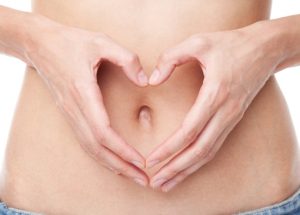Posted on August 18, 2017 by Kate Halsall
Do you struggle with a bloated stomach or the feeling that it’s a bit more swollen than usual? We’re not talking “holiday tummy” here, or that feeling of fullness after we’ve had a massive meal. It’s that feeling that everything from the chest down has swollen so out of control that you’re uncomfortable no matter how you stand or sit; your clothes which fit perfectly fine earlier are now too tight; and you feel that everyone is wondering whether you’re pregnant or have put on a tonne of weight…It’s stomach cramp for no reason, the trapped wind feeling without any trapped wind – in a nutshell – it’s a horrible feeling, but here are 3 things to try which might help reduce bloating – it’s got to be worth a go!
1. Check Your Fibre Intake!
- How Much?
Your diet may be very healthy but are you getting enough fibre in it? We’re supposed to be having between 25-30g of fibre a day, but most of us only get 15-18g! This may come as a shock to you but eggs and fish have no dietary fibre in them, where as half a cup of porridge with a cup of raspberries will provide you with between 10-12g of dietary fibre! You need to eat around 100g of chickpeas to get 5g of fibre whereas just 3 tablespoons of peas will provide you with same amount!
- What Kind?
There are two types of fibre: soluable and insoluable – and your diet needs to be rich in both. Insoluable fibre helps prevent constipation and is found in nuts and dark green leafy veg. Soluable fibre slows down your digestion and helps you feel fuller for longer. It’s found in oats and fruit. Hopefully including these in your diet will help reduce bloating.
2. Avoid Inflammatory Foods!
If you’ve read any of our blogs before you know to avoid processed food, refined flour and sugar already. But there are other foods which are healthy but could be causing the bloating. To cut a long story short, some carbohydrates such as beans and pulses are difficult for some people to digest, instead they ferment in the intestine and cause gas – hence bloating. Read more about FODMAPS here.
- Food For Thought
Consider soaking beans or pulses prior to cooking as this can apparently help. The sugar in dairy products (lactose) can be difficult to digest and as a result may cause bloating, so reduce the amount of dairy that you eat. Onions, garlic and broccoli can also cause bloating – ensure that they are thoroughly cooked or try alternatives.
3. Probiotics
Do you remember the adverts about “good bacteria”? Well probiotics are exactly that and can help with digestion, bowel and gut problems.
- Not Just Supplements
Whilst you can buy probiotics in pill form, and I have a powdered digestion aid, there are natural sources. Yoghurts which contain “Live/Active Cultures” are a great natural source – unless of course you have problems with dairy or lactose! Alternatively look at fermented foods such as miso, sauerkraut or kimchi.
- Keep in Mind
I’m not a doctor. I cannot prove that a probiotic will help your particular problem.
So, your take home message is:
If you eat a healthy balanced diet, it may be that none of these are your issue – these are just suggestions to check. One key thing though – if you are concerned about your fibre intake and feel you need to up it – don’t start stuffing your face with high fibre food as you’ll end up bloated for all the wrong reasons! The quickest and easiest way to add a bit more fibre into your diet is by adding 1 tablespoon of flax or chia seeds to your food – as these pack 3-5g fibre in that one tablespoon!
https://www.nutrition.org.uk/healthyliving/basics/fibre.html
www.healthline.com/nutrition/13-foods-that-cause-bloating
http://www.nhs.uk/Livewell/digestive-health/Pages/beat-the-bloat.aspx
http://www.washingtontimes.com/news/2017/may/19/health-probiotics-pros-and-cons/


